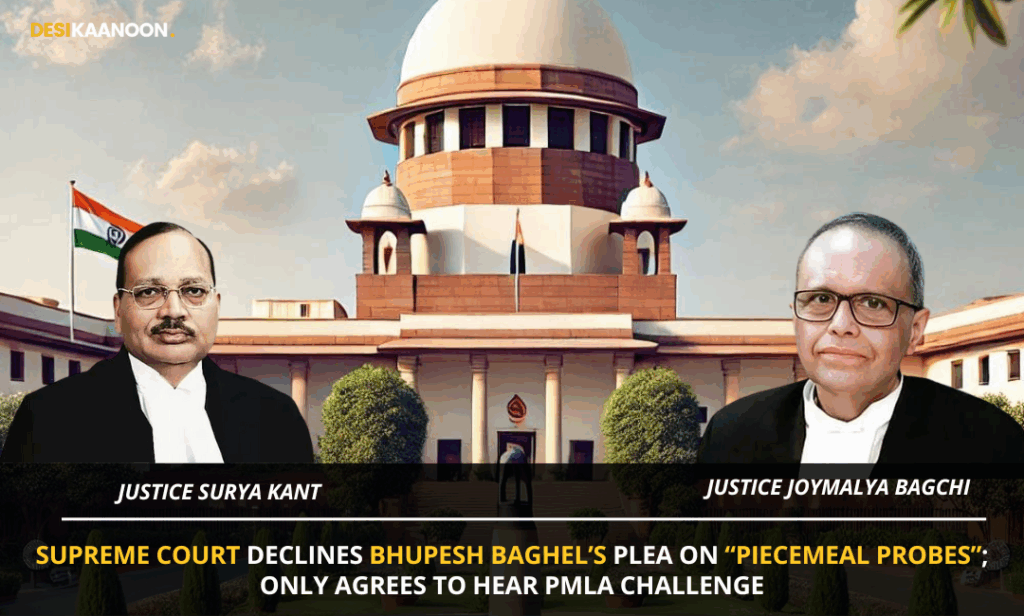Akhya Pandey
On 4th August 2025, the Supreme Court refused to entertain a petition filed by former Chhattisgarh Chief Minister Bhupesh Baghel, in which he challenged the manner in which investigative agencies like the Enforcement Directorate (ED) and Central Bureau of Investigation (CBI) were allegedly filing successive and piecemeal charge sheets in the ₹2,000 crore liquor scam case.
A Division Bench comprising Justice Surya Kant and Justice Joymalya Bagchi observed that such grievances should first be raised before the appropriate High Court or Trial Court. The Court emphasized that the judicial process must begin at the proper forum and warned against influential litigants bypassing the lower courts. The bench remarked that such direct petitions, often filed by powerful individuals, risk distorting the functioning of the justice system and limit access for ordinary citizens and lawyers. Bhupesh Baghel had approached the Apex Court alleging misuse of investigative powers and harassment through prolonged probes, but the Court declined to interfere at this stage.
The Court also refused to entertain a similar plea filed by Baghel’s son, Chaitanya Baghel, who was arrested by the ED on 18th July, 2025, in the same case. He has been given the liberty to withdraw his petition and approach the Chhattisgarh High Court for relief. However, the Supreme Court did agree to hear Bhupesh Baghel’s separate constitutional challenge to certain provisions of the Prevention of Money Laundering Act, 2002 (PMLA), particularly Sections 50 and 63. Section 50 gives the ED powers to summon individuals, record statements, and demand documents, while Section 63 provides penal consequences for failure to comply. Baghel argued that these provisions infringe on fundamental rights guaranteed under Articles 14, 20, and 21 of the Constitution, including the right to silence and protection against self-incrimination.
In his petition, Baghel also raised the issue of how repeated filing of supplementary charge sheets by investigative agencies after the statutory time period can be used to defeat the right to default bail, which is protected under Section 167(2) of the Code of Criminal Procedure, 1973. He submitted that there is a need to ensure judicial oversight when “further investigations” are initiated post charge sheet. The bench took note of these legal questions and scheduled the hearing on this constitutional challenge for August 6, 2025, along with other similar petitions raising concerns about the PMLA.
The Supreme Court’s refusal to hear the challenge to piecemeal investigations at this stage reflects its broader stance on ensuring that procedural discipline is maintained in litigation. The Court reiterated the importance of respecting the court hierarchy and emphasized that the Supreme Court cannot become the first port of call for every aggrieved party, especially when remedies exist at the High Court level. However, by agreeing to hear the constitutional challenge to the PMLA provisions, the Court has acknowledged the serious legal implications that arose in the matter, particularly regarding due process and fundamental rights under criminal investigations.
Bench: Justice Surya Kant and Justice Joymalya Bagchi
Case Title: Bhupesh Kumar Baghel v. Union of India and Ors
Case Number: W.P. (Crl.) No. 301/2025 — Bhupesh Kumar Baghel’s petition
Instagram: Click Here.
LinkedIn: Click Here.
For Collaboration and Business: Click Here.

